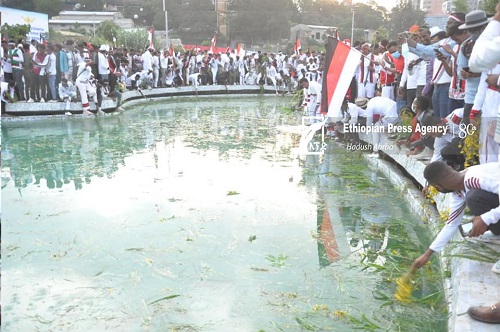
BY YOHANES JEMANEH
Meriho Meriho is the first thing that pops up into the mind of every Oromo adult when s/he thinks about Irreechaa, Oromo people’s Thanksgiving Day. It includes a choir which beseeches God to send His forgiveness. It is sung by Irreechaa celebrants who attend the festival that takes place twice a year. The celebrants chant the Meriho Meriho which literally means “may the almighty forgive us.” They thank God for bestowing on them the blessed land.They also say prayers to have a successful and productive year. The song is also a reflection of this hope.
One of the salient public festivals in our country is Irreechaa holiday that promotes unity among the people. Irreechaa is a huge social treasure. It is an important source of tourism. “We have to promote this treasure and support our country,” said Oromia Regional State Chief Shimelis Abdisa in his welcoming message.
The Oromos celebrate Irreechaa during the wet and green season, he mentioned. It is a time in which streams quietly flow carrying pure water that allows lash grasses to grow. The fragrance of flowers and the chirping of birds here and there mark the beginning of the New Year. Happening at this time, Irreechaa serves a harbinger of brightness, greenery, symbolized by greenery and Adey (Yellow Diasy) flower. These all are believed to herald new era and flicker hope in the heart of the people. And the people who celebrate the holiday say prayer and express gratitude to God heading to rivers and high altitudes.
The trek to high altitude symbolizes people’s desire to get closer to God and also demonstrates faith and commitment to overcome problems. Cultures like Irreechaa are the showcases that manifest Ethiopia’s time-old history, unity and coexistence. Irreechaa is a reflection of ability to surmount challenging situations to suitable ones. It is a living legend that showcases the history former Ethiopians, who are rich in cultures and knowledge, ruled the eastern African region with ancient civilization in a democratic system. The magnetizing celebration of the festival that serves tourists’ attraction could be an income source to the capital, said Addis Ababa City Mayor Adanech Abebie in a panel discussion held on Friday themed “Irreechaa is a sign of hope and good wishes′′.
Irreechaa is about thanksgiving, forgiveness, love and unity. It is also praising the lord for what he has done to the people. During Irreechaa, no one speaks bad things except gratitude and forgiveness. In this holiday, celebrants display a slow dancing joining hands each other as a peaceful move to a new era. It is a platform in which hatred is neutralized by genuine forgiveness and love, and dissidence is erased by togetherness.
Attending Irreechaa celebration in the capital, Abba Gada Gofa Edo describes Irreechaa as a manifestation of happiness for embarking on the New Year. For him, the festival promotes coexistence so that it enables people to express their appreciation and love to each other regardless of their differences. It is the right system and process which leads the country to solve its problems through truth and reconciliation. The youth must preserve this culture and build a peaceful nation that entertains unity in diversity.
This year’s Irreechaa celebration is more colorful than the previous ones, according to Abba Moda Borena Geri. “All citizens from the four corners of the country have celebrated the day with us. We rejoiced the day through expressing love and respect each other.” The youth must keep the originality of this tradition and unity. As to him, many people misunderstand the traditional thanksgiving ceremony assuming it as a worship of water, but it is not. “We are just expressing gratitude to God to reach this day and address prayer to better future,” he noted
The Oromo people believed that God has created water before anything else. Therefore, they come together to celebrate the holiday around water bodies and thank God for what he has given them. It is not worshipping the water but thanking the creator, said Irreechaa Celebration Coordinator Kebede Deksisa.
Buying Kebede’s idea, Kesis Belay Mekonnen from the Ethiopian Orthodox Church noted that Irreechaa has nothing to do with idolatry. It is about thanking the God for giving all things to human being. It doesn’t contradict with any religion. It is just a cultural thing, according to him. The Oromos preach reconciliation. They may not have read the Bible that widely stipulates this concept but they traditionally do negotiating peoples to ensure love through forgiveness.
“This is a holy deed. I think all citizens need to join Irreechaa celebrants in this holyday with such a blessed activity. I call up on all citizens to draw lesson from this culture and preserve it as their own since it helps to strengthen people to people relation and improve country’s economy,” he noted.
Irreechaa is a public holiday celebrated by the Oromos twice a year to thank God. Several peoples have attended this year’s celebration in Addis Ababa here yesterday. In its spiritual perspective, celebration is a platform in which people come together to express their joy with various means including prayer, rhyme and dances decorated by traditional colorful attires. And Irreechaa is also a vital event to promote unity among all Ethiopians from cultural perspective.
The Ethiopian Herald October 3/2021





